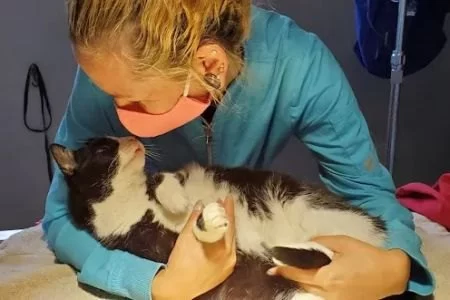- How to Recognize and Treat Pet Feline GI Disease
- 1 - Understanding Feline GI Disease
- 2 - Symptoms of Feline GI Disease
- 3 - Diagnosing Feline GI Disease
- 4 - Treatment Options for Feline GI Disease
- 5 - Prevention and Care Tips for Your Cat’s Digestive Health
- 6 - When to Consult Hidden Brook Veterinary
How to Recognize and Treat Pet Feline GI Disease
Feline gastrointestinal (GI) disease is a common yet often misunderstood condition affecting cats. Cats, like humans, can experience a range of digestive issues, from mild discomfort to serious illness. Understanding how to recognize the signs of GI disease in your cat and knowing how to treat it can significantly improve their quality of life. In this article, we will explore how to identify feline GI disease, its causes, treatment options, and how you can help your pet recover. Additionally, we'll discuss when it's crucial to seek professional help, such as from Hidden Brook Veterinary.
1 - Understanding Feline GI Disease
Feline GI disease refers to a broad range of conditions that affect the digestive tract of cats. These conditions can include anything from infections and parasites to inflammatory bowel disease (IBD) and more. The GI tract plays a crucial role in absorbing nutrients and eliminating waste, so when something goes wrong, it can lead to significant health issues.
GI diseases in cats are often classified based on the part of the digestive system they affect, such as the stomach, intestines, or colon. Conditions like vomiting, diarrhea, and constipation are often signs of GI problems. It's important to pay attention to these symptoms, as untreated GI diseases can lead to severe dehydration, malnutrition, and weight loss.
2 - Symptoms of Feline GI Disease
2.1 - Vomiting
One of the most common signs of feline GI disease is vomiting. Frequent vomiting can indicate a variety of digestive issues, including infections, food intolerance, or inflammatory conditions like IBD. If your cat vomits occasionally, it may not be a cause for concern. However, if vomiting becomes regular or if it’s accompanied by other symptoms, it may be time to consult a veterinarian.
2.2 - Diarrhea
Diarrhea is another key symptom of feline GI disease. It can result from infections, parasites, or dietary indiscretion. Chronic diarrhea, or diarrhea that lasts more than a few days, can lead to dehydration and should be addressed promptly. Keep in mind that diarrhea, when left untreated, can cause additional health problems, including nutrient malabsorption.
2.3 - Weight Loss and Lack of Appetite
Weight loss and a reduced appetite can also signal underlying GI issues. When a cat has digestive problems, they may not be able to properly absorb nutrients from their food. This can lead to weight loss, even though the cat may appear to be eating normally. If your cat is losing weight and showing less interest in food, it’s essential to investigate further to rule out serious GI conditions.
2.4 - Lethargy and Abdominal Discomfort
Gastrointestinal issues can also lead to lethargy and discomfort. Cats with stomach problems may become more withdrawn or less active. They may also exhibit signs of abdominal discomfort, such as restlessness, excessive grooming, or a sensitive abdomen when touched. This is especially concerning if the lethargy is accompanied by vomiting or diarrhea.
3 - Diagnosing Feline GI Disease
3.1 - Veterinary Examination
If you notice any of the symptoms mentioned above, it’s important to take your cat to the vet for a thorough examination. The vet will start by gathering a detailed medical history, including information about your cat's diet, behavior, and the frequency of symptoms.
A physical exam may involve checking your cat’s abdomen for tenderness and signs of bloating or discomfort. Depending on the initial findings, your vet may recommend further diagnostic tests.
3.2 - Diagnostic Tests
To diagnose feline GI disease, veterinarians may use a variety of tests. Common diagnostic procedures include:
- Fecal tests: These help detect parasites or infections in your cat's stool.
- Blood tests: Blood tests can reveal signs of infection, inflammation, or organ dysfunction.
- Ultrasound or X-rays: Imaging tests can provide a clear view of the internal organs and detect any abnormalities in the digestive system.
- Endoscopy or biopsy: In some cases, your vet may perform an endoscopy to examine the stomach or intestines or take tissue samples to further diagnose conditions like IBD or cancer.
4 - Treatment Options for Feline GI Disease
4.1 - Medications
Treatment for feline GI disease depends on the underlying cause. If your cat has an infection or parasites, the vet may prescribe antibiotics or antiparasitic medications. For inflammatory bowel disease (IBD), treatment may include anti-inflammatory drugs or steroids to reduce inflammation in the digestive tract.
4.2 - Special Diets
Diet plays a critical role in the treatment of feline GI disease. Many cats with digestive issues benefit from a special diet designed to be gentle on their stomachs. These diets are often formulated to reduce inflammation, aid digestion, and improve nutrient absorption. Your vet may recommend a prescription diet or suggest specific foods to include or avoid based on your cat’s condition.
4.3 - Fluid Therapy
If your cat is severely dehydrated from vomiting or diarrhea, fluid therapy may be necessary. This treatment helps replenish lost fluids and restore electrolyte balance, which is essential for recovery. Fluid therapy can be administered at the vet clinic or at home, depending on the severity of the dehydration.
5 - Prevention and Care Tips for Your Cat’s Digestive Health
5.1 - Regular Vet Check-ups
Preventing feline GI disease involves regular check-ups with your veterinarian. Routine visits ensure that any underlying health issues are caught early, before they become serious problems. Your vet will also help you choose the right diet for your cat, which can play a significant role in preventing digestive issues.
5.2 - Proper Diet and Hydration
A balanced diet and proper hydration are key to maintaining your cat's digestive health. Ensure that your cat has access to fresh water at all times and provide high-quality food that supports their overall health. If your cat is prone to gastrointestinal issues, consider feeding smaller, more frequent meals throughout the day.
5.3 - Stress Management
Stress can also contribute to gastrointestinal problems in cats. Create a calm, comfortable environment for your cat and provide plenty of opportunities for play and exercise. Stress-relief techniques, such as pheromone diffusers or calming treats, can help reduce anxiety and improve digestion.
6 - When to Consult Hidden Brook Veterinary
If you suspect your cat has a gastrointestinal issue, or if your cat is showing symptoms such as vomiting, diarrhea, weight loss, or lethargy, it’s important to seek professional help as soon as possible. Hidden Brook Veterinary provides comprehensive care and treatment for all types of feline digestive disorders. Our team of experienced veterinarians is dedicated to providing the best care for your pet, ensuring that they receive the right treatment to recover and thrive.
Don’t wait until symptoms worsen—contact Hidden Brook Veterinary for expert advice and personalized care for your feline companion.












